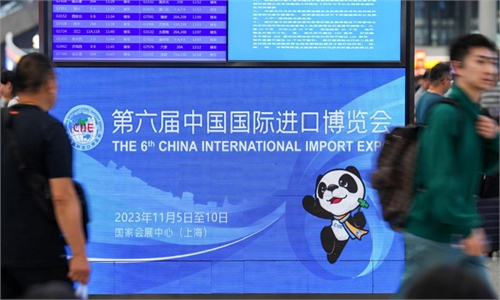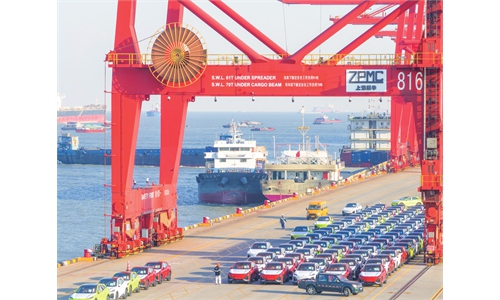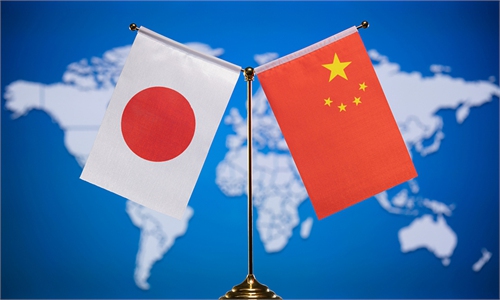Tetsuro Homma: China’s massive market becomes a ‘training ground’ for multinational companies to improve global competitiveness
Endowed with massive human resources, China is ideal place for multinational business running: Panasonic executive

China's Economic Strengths
Editor's Note:
As the Chinese economy, along with the entire global economy, has been facing considerable challenges in recent years, some Western officials and media outlets have stepped up their long-standing smear campaign against the world's second-largest economy. They cherry-pick information and even distort facts to hype various specious narratives such as "Peak China," while turn a blind eye to China's considerable strengths and vast potential.
In order to set the record straight, the Global Times is launching a multimedia project, which will include in-depth articles, objective analysis, and visual arts, to present a large, comprehensive and true picture of the Chinese economy. Our reporters will travel across the country from the old industrial base in Northeast China to the burgeoning Greater Bay Area in South China. They will document new development trends, new business models and new growth drivers, in order to demonstrate China's economic strengths and its vast potential. This is the third installation of the series.
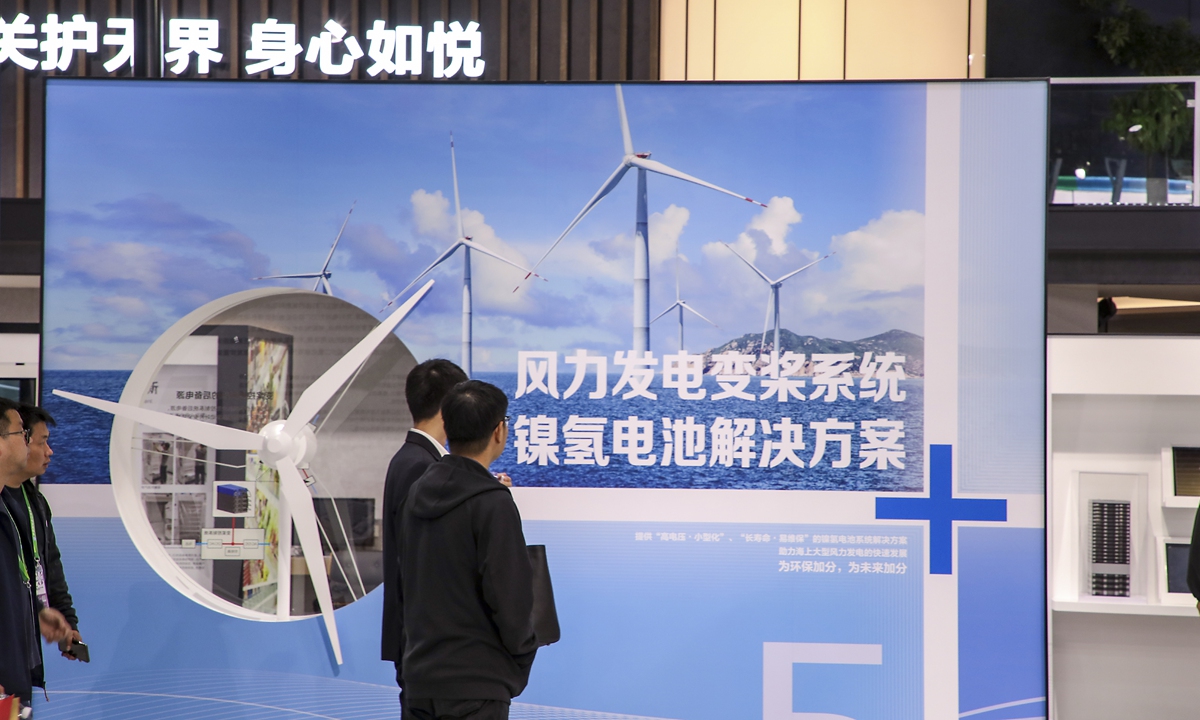
A booth of Panasonic at the 6th China International Import Expo held on November 9, 2023 in Shanghai Photo: VCG
On Monday, the Ninth China-Japan-ROK Trilateral Summit Meeting will resume in Seoul, South Korea, after a hiatus of more than four years. The leaders of the three countries will reportedly exchange views with business leaders on economic and trade cooperation. Global Times reporters recently communicated with leaders from Japanese and Korean companies in China, and found that they attach great importance to the Chinese market and look forward to taking the revival of the meeting as an opportunity to inject new momentum into future trilateral cooperation.
The Global Times (GT) recently held an exclusive interview with Tetsuro Homma (Homma), executive vice president of Panasonic Holdings Corporation and group chief executive for China & Northeast Asia in Beijing.
Homma, who also serves as president of the Japanese Chamber of Commerce and Industry in China (CJCCI) stated that multinational companies are paying increasing attention to the Chinese market.
He is not alone. In the course of exchanges with Japanese and South Korean entrepreneurs in recent years, many of them told the Global Times that Japanese and South Korean companies were the first group to come to China in the early days of reform and opening-up. As China's economy took off, foreign enterprises in China have also reaped large profits.
They said that at a time when the global economy is showing weakness, taking the opportunity of restarting the meeting will help inject new momentum into future cooperation among the three countries. The traction gained from this will also push the global economy forward.
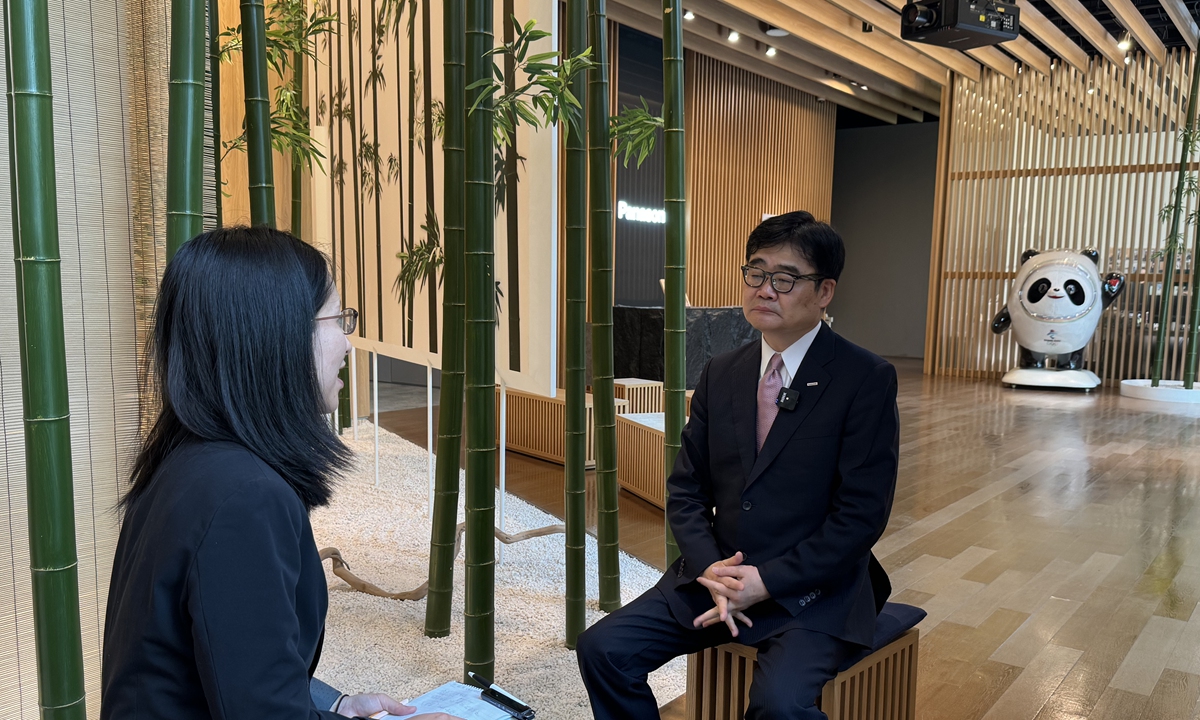
GT reporter Xing Xiaojing interviews Tetsuro Homma, Executive Vice President of Panasonic Holdings Corporation and Group Chief Executive for China & Northeast Asia in Beijing on April 25, 2024. Photo: Wang Pu/GT
GT: Panasonic has a deep relationship with China, as it set up one of the earliest Japan-China joint ventures in the early stages of China's reform and opening-up. The bilateral relations have undergone major changes during the past four decades, as China has developed from a country in a dire need of technology assistance to become the world's factory and major market. What strategic adjustments has your company made to adapt to the changing time?
Homma: Visiting the Panasonic Electric Factory was an important stop by Chinese chief designer of reform and opening-up Deng Xiaoping, and such tour also started the connection between Panasonic and China. Konosuke Matsushita, then 84, invited to visit China in 1979, and also in 1980, becoming the first well-known international entrepreneur to visit China after 1949. In September 1987, the company and Beijing's municipal authorities finally opened Beijing Matsushita Color CRT, the largest Sino-Japanese joint venture at that time.
In the early stages of entering China, we brought production equipment, professional knowledge, management models, accounting principles and other elements needed for modern manufacturing. In the 1990s, businesses such as the production of home appliances and parts were launched. The idea at that time was to serve the Chinese market and provide products to Chinese consumers.
As China's supply chain continues to develop, we adjusted our strategies and increased exports to sell products produced in China to the world.
At the same time, Panasonic has begun to build a Chinese R&D team. Currently, R&D personnel account for about 1/5 of the approximately 50,000 employees in China. Now our products in China are mostly developed by the Chinese team. Next, we hope to further strengthen the R&D strength of the Chinese team to serve global customers.
GT: In 2019, Panasonic established China and Northeast Asia Company headquartered in Beijing, and local business decisions were made by a local team instead of Japanese headquarters. At the same time, you yourself served as the first president based in Beijing. This kind of operation is rare among Japanese companies. Can you give us some background?
Homma: The Chinese market is changing too fast, and consumption mentality of young people is also different from other countries. This made me realize that business decisions in China must be made by local management teams, which would improve enterprise competitiveness.
I still remember that after the plan was proposed, the board of the group discussed it for a long time, because such situation is relatively rare among multinational companies around the world. The then President Kazuhiro Tsuga attached great importance to the Chinese market. He visited six or seven times every year, communicating with Chinese partners, industry experts, universities, and competitors for many suggestions. He believed that the only way to be successful is for Chinese business to be decided by local teams and adapt to the Chinese market. Therefore, with the support of the board, Panasonic Group established China and Northeast Asia Company in 2019.
GT: You mentioned that the situation is relatively rare among multinational companies around the world. In your view, what was the decisive factor leading to the board's final approval?
Homma: I think it should be the emphasis on the Chinese market. China is the world's second largest economy and its market is huge. If growth cannot be achieved in the Chinese market, it will be even more difficult to achieve on a global scale. When I joined the company in 1985, Panasonic's business in China accounted for less than 2 percent of its annual business revenue. Now this figure has climbed to 27 percent. Such change has shown why we should attach importance to the Chinese market.
GT: You have served as the new president of the CJCCI since April 2023. This is the first time in 43 years since the chamber was established that a Japanese business executive with a manufacturing background has served as its president. I still remembered that at the press conference that day, you said, "Japanese companies should regard China as a 'big country of innovation' and a 'big country of engineers' rather than a 'big manufacturing country' and a 'big consumption country.' Can you elaborate on that?
Homma: Data showed that currently there are less than 600,000 Japanese university graduates who want to work in private enterprises, while China has more than 10 million university graduates every year, of which science and engineering talent account for about 60 percent. This figure is enough to prove that China is a "big country of engineers."
I visited Chinese mainland in 1989. At that time, there were almost no cars on the streets of Shanghai. There was not even a highway in Puxi. Pudong had not yet begun to develop. However, in just over 30 years, China, including Shanghai has undertaken big changes. Such rapid development in a short period has made the Chinese people more receptive to various innovations and technological innovations, and they are also very capable of learning and developing new technologies.
A major feature of the Chinese market is that it is relatively tolerant of innovation failures, which is not easily accepted in advanced countries. Chinese consumers are also willing to accept new products. For example, clothes dryers and dishwashers have become popular in recent years. This helps multinational companies observe new consumption trends and apply them to the global market. Nowadays, innovation is everywhere in China. This is the main reason why I think China is a "big country of innovation" and a "big country of engineers."
GT: Can it be understood that the Chinese market tolerates innovation and Chinese consumers accept innovation, motivating more companies to continue to innovate?
Homma: Yes. When I entered Panasonic more than 30 years ago, the Japanese market was the market which was willing to accept new products. For example, the Japanese market was the first to accept new household appliances such as video recorders and CD players.
However, as Japan enters an aging society, its acceptance of new products has declined. Some of the exhibits in the Matsushita Memorial Hall were developed by the Japanese R&D team 10 years ago but failed to be put on the market. Instead, they were launched in the Chinese market and then sold around the world. To a certain extent, the Chinese market drives innovation, and Japanese companies in China embrace innovation.
GT: China's improving business environment is attracting more foreign companies, coupled with the rapid development of local companies, how does your company improve competitiveness in the Chinese market? Will these help your company compete in the international market?
Homma: Since the establishment of China and Northeast Asia Company five years ago, we have always adhered to the principle of "China speed, China cost, and China model" to adapt to the Chinese market. In the past, some employees paid too much attention to traditional practices, and I encouraged everyone to emancipate their minds. Emancipating the mind is easier to say rather than to do.
In the early years, the company sent some outstanding Chinese talent to Japan for training, and such knowledge and experience were valuable assets to them. It is not easy for a person to give up the successful experience in the past.
However, at that time, there was already a strong sense of crisis awareness. If we could not take advantage of the trend, what awaited us might be a shrinking business. Konosuke Matsushita proposed "daily innovation", which means that we must actively adapt to the market.
The Chinese market has incomparable advantages in terms of innovation speed, market size, intelligentization process, ability to absorb and digest new technologies, talent reserves and supply chain. The Chinese market has become an important training ground for multinational enterprises to enhance their competitiveness. In my opinion, a market with only competition and no successful cases would be "nerve-wracking". This is not the case in China, so what we have to do is do our best to improve ourselves. If we can capture a certain share of the Chinese market, our competitiveness in the global market will undoubtedly be enhanced.
GT: At the China-Japan leaders' meeting held in San Francisco last November, the two sides reaffirmed the positioning of comprehensively advancing the strategic and mutually beneficial relations between China and Japan. However, Japanese Prime Minister Fumio Kishida strengthened the Japan-US alliance during his visit to the US in April and called on Japanese companies to increase investment in the US. Will this have an impact on Japanese companies in China? What are the comments of Japanese business community?
Homma: Actually, many Japanese companies investing in China are also investing in the US. Panasonic is also building a battery factory in the US. As a multinational company, the Chinese market is important to us, but it does not prevent us from exploring markets in other countries.
GT: China is the largest trading partner of most countries in the world, and China's participation and importance in the global value chain has not diminished. Meanwhile, there are fallacies such as "China's economic collapse" and narratives of "decoupling." What are your comments on them?
Homma: There is a consensus in the Japanese industry that "the strongest organization is the one that can adapt to the new normal." As early as the 1970s, Japanese companies encountered international trade wars. Panasonic encountered "wars" such as color TVs, video recorders, and mobile phones from the 1970s to the late 1990s. Whenever the international situation became tense, it has to adjust its strategies to adapt to the new environment, which is the only solution.
I have also observed that some Chinese companies have begun to adopt corresponding countermeasures, and I believe that Chinese companies are also constantly honing their own strength in the process of encountering and solving problems.
China has a vast market and rich talent pool. China is always an ideal stage for foreign companies. Japan and China have had very close trade exchanges in the past few decades. I believe that there is still huge room for cooperation in the future in jointly dealing with aging, health care, medical care and other issues.

